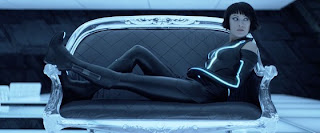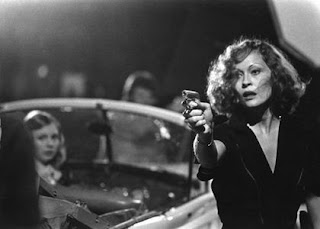But the biggest thing holding this movie back from being more than a guilty pleasure is the script, penned by Eddie Kitsis and Adam Horowitz. That fact is a bit of a letdown for me as a LOST aficionado, as their names will be familiar to fans of the show--the writing partners had their names on no less than twenty episodes of the series, in addition to serving as executive producers for much of its run. Where LOST had hugely imaginative big-picture stories to tell and had fun filling in the details, with Tron, it's quite clear the creative forces behind the project spent a lot of energy creating a world like you've never seen before, and relied on a very bare bones, How-to-Write-a-Screenplay story arc for the narrative.
I know, I know, I'd never guess they were writers either.
Such an imbalance of immense production resource and impotent writing is nothing new in Hollywood. In fact, it's endemic. Transformers, and in fact Michael Bay's entire oeuvre, is my go-to example of this imbalance.
I have never been a believer of the "it's just a popcorn movie" defense. I hold up Raiders of the Lost Ark and RoboCop as examples of "popcorn" movies that can be so much more than anything Bay has managed to conjure -- Raiders, for its bar-setting craftsmanship, and RoboCop, for its pitch-perfect blending of 80s genre convention and subversive social commentary. It's borderline offensive, frankly, that a studio will spend a half-billion dollars on a movie like Avatar. For all that film's technical showmanship, it featured a script that seemed like a second draft--its characters so archetypical, its political commentary so ham-fisted it made this dyed-in-the-wool liberal want to drive a Humvee through a tolerance rally on his way to the shooting range.
Pictured: Last of the Na'vi.
So why, then, did I not feel I had been patronized by the formulaic storytelling of Tron: Legacy? Why did I, in fact, really enjoy it?
Frankly, I was "bought out" by the allure of its images, its sounds, and its movement. But let us not forget that cinema is an art form that first and foremost is about the arousal of the senses. Unlike Avatar's techno-organic world, which echoed everything in the last decade already seen in the Star Wars prequels and Lord of the Rings, or the brutishly ugly, overripe world of Transformers, the screen has never seen anything that looks like Tron:
It's a good choice, though--Bridges' persona has become almost intertwined with that career-defining character, and it gives him a chance to stand apart from the techno-bobbleheads that populate Flynn's creation.
Olivia Wilde makes Quorra an alluring, tomboyish pixie of a sidekick, and for whatever faults the script posesses, the authors wisely never let her and protagonist Sam achieve the perfunctory late-second-act romance. Sam, for his part, is a stony-faced and rather forgettable character--the same kind of devil-may-care-rich-kid-who-learns-to-make-a-difference (spoiler alert) that is everywhere in these movies these days. No joke, before Tron started rolling, the trailers for The Green Lantern and The Green Hornet demonstrated virtually identical protagonists. (Some have pointed out the shot-for-shot similarities between how Lantern's backstory and Iron Man's backstory are established in their respective trailers.)
He makes this face in 99.8% of the film (margin of error ± 5%)
If it does come to pass that this most improbable of films--a mega-budget sequel to a once-forgotten children's movie from a quarter-century ago--garners a threequel, it will have to do better. The permissiveness granted by sheer novelty will have worn off. But for now, it's nice to go back to the Grid.
P.S.: So, this is a movie called "Tron," right? And the titular character is only in it as a second-string supporting character until he makes a crucial, if unexplained, decision late in the third act? And we never get a good look at his face? Umm, okay. Someone probably should have made a "note" to the writers on that one.


















